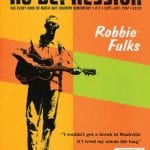Ray Wylie Hubbard – Put down the gun
Two years ago, “The Messenger” appeared at the end of a tape a friend made for me, sounding with a shock of recognition, knocking me out of some cross-state driving daydream and into a world that was fierce, visionary, and crystalline.
I’m wearing old boots, black Cuban heels
Our soles they are worn and we stand here by grace
My trousers are torn and my jacket is borrowed
And I’m wearing my time behind the eyes in my face
I am not looking for loose diamonds
Or pretty girls with crosses round their necks
I don’t want for roses or water
I’m not looking for God
I’m not looking for sex
With the purest D-C-G changes over two guitars, their bronze wound strains woven into gold, the story of some traveler, some songwriter, becomes intensely visible, yet barely fixed in time and place, as he makes his journey — suggesting not a heralding angel, but a character like Harry Dean Stanton in Paris, Texas: a man who has forgotten what he looks for, or won’t or can’t say, but who carries a secret wisdom of hard-won hope nonetheless.
Ray Wylie Hubbard’s work often cites the other voices he carries with him. “It’s called ‘sampling,’ I think,” he cracks. There’s Leon Payne in “Loco Gringo’s Lament”, Tim Hardin in “The Real Trick”, Gram Parsons and Dylan in “Ballad of the Crimson Kings” — but Hubbard possesses that rare ability to renew and recast those sources. The message of “The Messenger” flares up in a line from Rainer Maria Rilke’s most famous letter — “Our fears are like dragons guarding our most precious treasures” — but the notion was there from the beginning, in the figure still standing and still looking after all the trials of time. “After you get through with a song like that,” Hubbard says, “you just say ‘Thanks.’ You don’t know where the words and phrases came from.”
Hubbard’s story begins in Dallas, where he first heard the musicians who were forming one of country music’s most important subcultures. “I went to high school in Dallas with Michael Murphey and B.W. Stevenson, and a guy named Larry Gross [now host of “Mountain Stage”]. There was a big folk scene and the influences of that time were Woody Guthrie, Jimmie Rodgers, Bob Dylan and all that. At that time growing up in Dallas, one night you’d go to a little club and see Freddie King and the next night you’d see Willie Nelson. Then we’d go up to Oklahoma City and see Mance Lipscomb.” The latter is an oft-overlooked Texas country bluesman who, while not a great innovator, disseminated the elegant melodic fingerstyle work inseparable from the Texas troubadour school. Indeed, Lipscomb is another version of The Messenger.
Hubbard quickly absorbed those influences but was “sidetracked,” as he often puts it, for an early recording career of persistent false starts. “Those [first records] don’t count,” he says. “They were just half-baked projects, under-funded, and with lots of extenuating circumstances. They weren’t real….My history of recording was just never complete. My first record on Warner/Reprise, Ray Wylie Hubbard and the Cowboy Twinkies, was like that. Though I had been playing a lot of acoustic stuff, I had these friends and we discovered beer and electricity. So by God we got us a band. We’d recorded a record in Austin that got us offers from places like Atlantic, and Frank Zappa’s label Discreet really liked it. But we never could get the record company to release the record we had. They always wanted to go re-record it.
“So we went to Nashville with the band. After we left, they put girl singers on it and tried to make it commercial country. But they had no idea what we were doing, no idea what we were about. We gave them the working art for the cover and they put rope letters on it, and so when the record came out, we listened to it and were just, well, depressed. We worked hard on it and when it came out, it just devastated us. We couldn’t go out and tour with it. We waited out that contract and didn’t record again. It really hurt.”
Yet the record contains material of a depth that outstrips all but a few of his more famous contemporaries. Especially exquisite is “Portales”, with its chorus, “It’s a hand-woven love song of sadness.” Then in 1978, at the request of Willie Nelson and his fledgling Lone Star Records, Hubbard cobbled together demos he had scattered across Texas and released Off The Wall. Hubbard made the record on the condition that the follow-up would have a real budget and producer, though when Nelson signed to CBS, the condition was moot. Off The Wall had no “Portales”, but it did contain Hubbard’s version of his own “Up Against The Wall Redneck Mother”, the most notorious cut on Jerry Jeff Walker’s Viva Terlingua and a song Hubbard still can’t shake. At gigs he’ll succumb to the requests and introduce it with a cautionary tale: “Never write a song you won’t want to sing for the rest of your life.”




